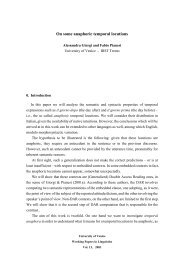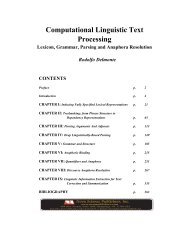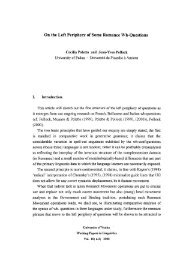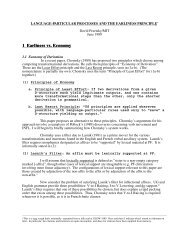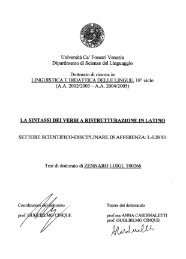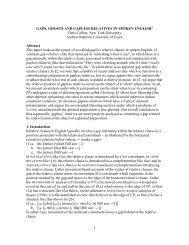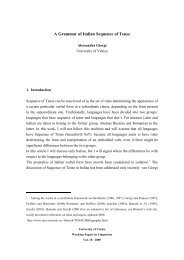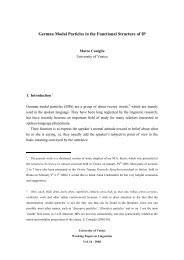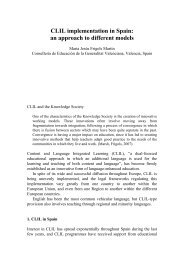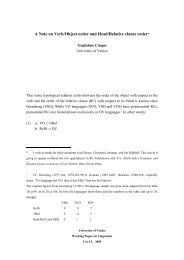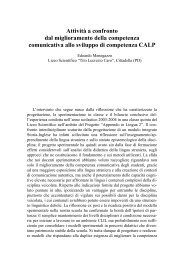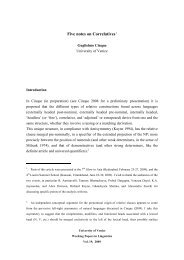Untitled - Lear
Untitled - Lear
Untitled - Lear
You also want an ePaper? Increase the reach of your titles
YUMPU automatically turns print PDFs into web optimized ePapers that Google loves.
Valentina Bianchi<br />
10<br />
dead one day<br />
no<br />
night<br />
dead one night<br />
3. The syntax of the subject<br />
The syntactic devices discussed above give the impression of a “verb-less” and<br />
“subject-less” language. In fact, in the ordinary use of language every finite verb in<br />
English has an expressed subject, even when the latter has no actual reference, as in<br />
the case of weather verbs (5a) and of extraposed subject clauses (5b):<br />
(5) a. It is raining.<br />
b. It is clear that you made a mistake.<br />
c. She is speaking.<br />
In generative syntax, Modern English is dubbed an “absolutely non-pro-drop<br />
language”, since it cannot drop a pronominal subject of a finite verb, not even an<br />
expletive one. Other languages like e.g. Russian allow for partial drop of expletive<br />
subjects, and fully pro-drop languages like Italian can drop any pronominal subject;<br />
for a thorough discussion, see among othjìers Rizzi (1986) and Jaeggli & Safir<br />
(1989).<br />
At this point we can discuss the most striking aspect of the syntax of Rockaby.<br />
Besides avoiding finite verbs, Beckett strongly deviates from the ordinary use of<br />
language in that he often omits the subject of finite verbs. (Note in passing that this<br />
exceptional character of the syntax of Rockaby cannot be properly rendered when<br />
translating the text in a pro-drop language like Italian, which has free omission of<br />
pronominal subjects, as mentioned above.) If I counted correctly, out of 62 finite<br />
verbs 41 have an expressed subject, and 21 an omitted subject. 6 I report here all the<br />
unambiguous cases of subject omission with a finite verb:<br />
6 In the case of two coordinated verbs, the expressed subject precedes the first one, but also<br />
the second one was obviously counted as having an expressed subject. In some cases,<br />
however, it is unclear whether a finite verb is really coordinated to the preceding one, e.g. in<br />
the following passage (repeated several times):<br />
till in the end<br />
the day came<br />
in the end came<br />
close of a long day…<br />
I counted the second occurrence of came as endowed with an expressed subject like the first<br />
one, but actually this is not a straightforward case of coordination. If we consider the second<br />
occurrence of came subjectless, the number of expressed subjects is 37 out of 62 finite verbs.



